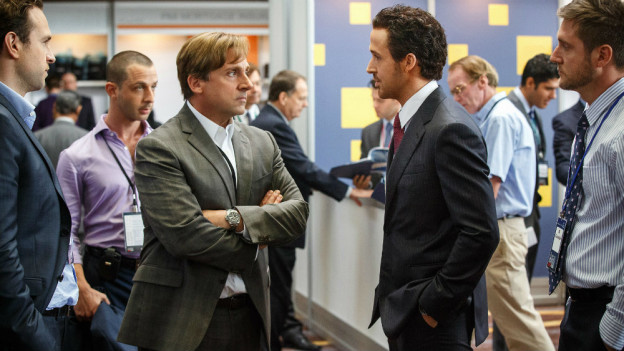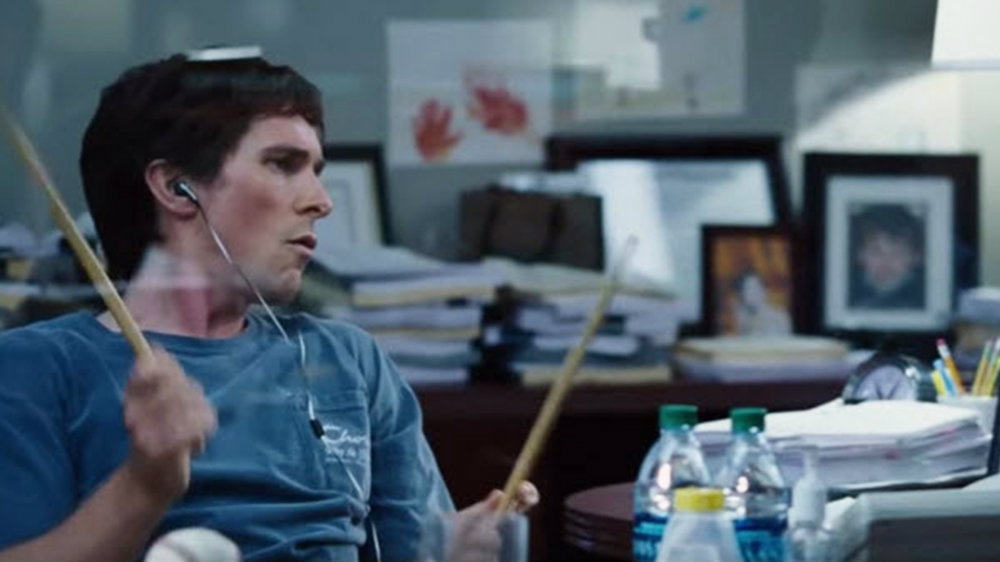Anchorman. Step Brothers. The Big Short? Perhaps the most surprising thing about the new comedy/drama centering on the 2008 financial crisis is that it comes from the director of a string of Will Ferrell comedies. With this film, Adam McKay branches out of the realm of pure silliness for something a bit more substantive and winds up proving that his storytelling prowess runs far deeper than anyone would have thought.
Based on the 2010 Michael Lewis best-seller, The Big Short follows a handful of men who glimpse the economic downturn and decide to bet big against the “too big to fail” banking industry. This eccentric ensemble includes hedge fund managers Michael Burry (Christian Bale) and Mark Baum (Steve Carell), trader Jared Vennett (Ryan Gosling) and retired banker Ben Rickert (Brad Pitt, who also serves as a producer), and the film tracks the period from 2005 to the inevitable implosion of the housing market and credit bubble years later.
The film’s narrative centers on detailed concepts like subprime mortgages, CDOs (collateralized debt obligations, for those unfamiliar) and credit default swaps, but McKay deftly dodges nearly all of the pitfalls that would otherwise bog down a story that hinges on such cumbersome subject matter. In a clever running gag, the filmmaker recruits celebrities like Margot Robbie, Anthony Bourdain and Selena Gomez to help break down some of the more complicated ideas that The Big Short directly deals with.
The breezy, playful script — co-written by McKay and Charles Randolph (Love & Other Drugs) — even breaks the fourth wall on occasion, allowing the characters to clarify when the onscreen narrative takes liberties with their real-life stories. Due to the dense nature of the story, The Big Short never allows audiences to get too invested in any of its central characters, and this plot-over-character approach may alienate some viewers.
However, McKay’s approach ultimately benefits the film as a whole, putting the financial crisis itself front and center. By not even attempting to adequately service such a sprawling cast, the resulting film — which still boasts engrossing performances all-around, particularly from Bale and Carell — remains far more focused, and, even at just over two hours, it feels about as tight a script as could be expected with this story.
For much of its runtime, The Big Short lulls viewers into rooting for its main characters before making a far more sobering point regarding just how unjust the system really is. It’s a bit of a bait-and-switch on the part of McKay and the rest of the film’s creative team, but the message it leaves audiences with is a fitting one considering the widespread despair that resulted from the economy’s collapse.
Audiences looking for escapist entertainment might be humbled by The Big Short‘s detailed examination of the events that befell the U.S. economic framework only a few years ago, but the story of the film isn’t only an incisive, enlightening piece of entertainment but one that succeeds in capturing the general malaise of the event itself.
Rating: 3.5 out of 5
The Big Short stars Steve Carell, Christian Bale, Ryan Gosling, Marisa Tomei, Melissa Leo and Brad Pitt. It is directed by Adam McKay.Follow Robert Yaniz Jr. on Twitter @CrookedTable! Click here for more Crooked Table reviews!


